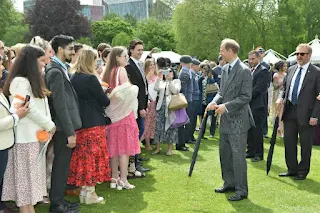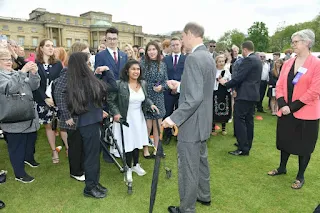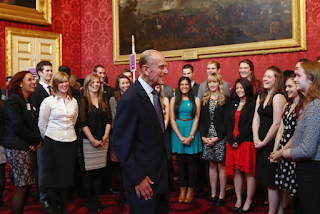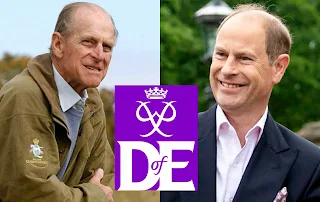On May 19, His Royal Highness Prince Edward, the Duke of Edinburgh will welcome 9,000 Gold Duke of Edinburgh Award holders to Buckingham Palace Garden, for first celebrations as charity’s Patron.
Ahead of the big celebration, around 2,200 Duke of Edinburgh’s Gold Award holders were guests of honor in Buckingham Palace's Garden on May 15 for the first of four very special events to mark their achievements. And The Duke of Edinburgh’s first Award celebrations for Prince Edward as the charity’s Patron.
 |
| Garden Party with the DofE Awardees |
The Buckingham Palace's Garden was transformed into a festival-style celebration for young people and their loved ones, with giant deckchairs, bunting, and garden games and activities.
 |
| Prince Edward, the Duke of Edinburgh welcomes DofE Awardees to Buckingham Palace Garden |
 |
| Prince Edward, the Duke of Edinburgh welcomes DofE Awardees to Buckingham Palace Garden |
 |
| Prince Edward, the Duke of Edinburgh welcomes DofE Awardees to Buckingham Palace Garden |
The current Duke of Edinburgh – who received his own Gold Award from his father, Prince Philip, in 1986 – congratulated attendees in a speech from the Palace’s West Terrace. The Duke also met Award holders, hearing about the positive impact their DofE has had on them.
The Duke of Edinburgh's Award
The Duke of Edinburgh's Award (commonly abbreviated DofE) is a youth awards program, a development framework, used by organizations who work with young people ages 14-24.
The Award empowers young people to build their self-confidence, develop their skills, learn, and grow through non-formal education, while working towards a globally recognized accreditation. From its infancy in the United Kingdom in 1956, it has now expanded to 144 nations.
 |
| Duke of Edinburgh Award logo |
The awards recognize adolescents and young adults for completing a series of self-improvement exercises modeled on Kurt Hahn's solutions to his "Six Declines of Modern Youth".
A separate entity, The Duke of Edinburgh's International Award Foundation, promotes the award abroad and acts as a coordinating body for award sponsors in other nations, organized into 62 National Award Authorities and a number of Independent Operators.
Award sponsors in countries outside the United Kingdom may call their awards The Duke of Edinburgh's Award, although the recognition also operates under a variety of other names in countries without a historic link to the British monarchy.
The Duke of Edinburgh's Award helped to transform the lives of millions of young people in the United Kingdom and across the globe. In the United Kingdom, the program is run by The Duke of Edinburgh's Award, a royal charter corporation.
 |
| Prince Philip, Duke of Edinburgh welcomes Awardees to Buckingham Palace in 2016 |
The Founder
In February 1956, four years after he became a prince consort and eight years before the birth of his youngest child (Prince Edward), Prince Philip, the Duke of Edinburgh, founded an award that would recognize and encourage the youths to develop their skills for the good of the community and build their confidence.
Prince Edward, the current Duke of Edinburgh, is the only one among the four children of the Queen and Prince Philip who participated and became a Gold awardee of the DofE. He took over the chairmanship of the Award Trustees from his father in 2015.
 |
| Prince Philip handed the Duke of Edinburgh's Award Gold certificate to his youngest son, Prince Edward, in 1986 |
Purpose:
The Duke of Edinburgh's Award has been designed to challenge young people between the ages of 14-24 to attain standards of achievement and endeavor in a wide variety of active interests – to serve their communities, experience adventure and to develop and learn outside the classroom.
Participation in the Award has grown every year since its inception. By 2017, over six million people had taken part in DofE programs in the UK, with over eight million worldwide.
Background of the Award
Prince Philip, the Duke of Edinburgh first considered the idea of a national program in the autumn of 1954. His purpose is to support young people's development, at the request of his former school headmaster, Kurt Hahn.
 |
| Prince Philip, Duke of Edinburgh (1921-2021) founded the DofE in February 1956 |
Prince Philip met Kurt Hahn, a German educator, in Baden, Germany when he spent his high school years at Schloss Salem, an elite private boarding school in Baden owned by the family of his brother-in-law, Prince Berthold. Kurt Hahn was the headmaster of the school.
But when Adolf Hitler began monitoring individuals with Jewish ancestry, Kurt Hahn left Germany and moved to Scotland to establish Gordonstoun. Prince Philip followed him there and finished his high school at Gordonstoun.
After the Second World War there was a growing concern about the development of boys, due to the gap between leaving school at 15 and entering National Service at 18.
Kurt Hahn believed that young people have more courage, more strength, and more compassion than they know. He felt that, if properly supported and challenged, these qualities could be developed for the good of young people and the communities in which they lived.
Inspired by the Moray Badge, for which Prince Philip had worked whilst a pupil at Gordonstoun School, The Duke of Edinburgh's Award was designed around four sections: Rescue and Public Service Training, The Expedition, Pursuits and Projects, and Fitness.
The Award was administered by John Hunt, who had led the first successful climb of Everest in 1953. Although initially only available to boys aged between 14 and 18, there was great demand for a similar program for girls.
In 1959, a girls' program was launched and, at the same time, the DofE formally became a charitable trust. Since then, the DofE has been open to all young people from every walk of life, sharing the common aim of challenging themselves to achieve their Award.
The DofE and the UK
The DofE has continued to evolve over the decades that followed. In the 1970s, the DofE began to partner with businesses to help young people who were at work, in training or job hunting.
Against a backdrop of rising youth unemployment, DofE open centers sprang up around the country giving young people the opportunity to participate in programs outside of a school environment.
Today, the Award forms a core part of many apprenticeships and training schemes in the UK, and employers are actively looking for DofE Award holders when recruiting, citing the important skills of teamwork, resilience and confidence the Award provides.
The DofE goes global
As soon as the DofE was launched there was widespread interest outside the UK in replicating the Award. It spread initially through the enthusiasm of international schools but soon youth organizations across the Commonwealth were running DofE programs for their young people.
By 1971, the DofE was operating in 31 countries, increasing to 48 countries by 1989 as it spread beyond the boundaries of the Commonwealth.
The expansion led to the creation of The Duke of Edinburgh’s International Award Foundation in 1988, which has made programs available to young people in more than 140 countries.
Nelson Mandela was the founding Patron-in-Chief of the President’s Award for Youth Empowerment (The Award in South Africa).
The spread of the DofE across the globe is testament to its universal appeal and the vision of its founder.
However, even Prince Philip admitted that it took him by surprise. When the first trial of the Award was launched in 1956, no one had any idea quite what would happen. In the event it was an instant success and the Award has been growing and expanding worldwide ever since.
The DofE Award Programs
The Duke of Edinburgh's Award programs take between one and four years to complete, and they must be completed by the participant's 25th birthday.
The programs are at three progressive levels which, if successfully completed, lead to a Bronze, Silver, or Gold Duke of Edinburgh's Award.
To achieve an award, the participant must work on each section for a minimum period of time, and must be monitored and assessed by someone with knowledge of the chosen activities.
Each progressive level demands more time and commitment from participants: Bronze 3–6 months; Silver: 6–9 months; Gold: 12–18 months.
Participants are required to show regular activity and commitment to the award for the duration of their DofE programs, which is usually at least one hour per week
The DofE and its mission to encourage personal discovery, self-reliance, and responsibility in an environment of social interaction and team work has remained unchanged through the course of over 60 years.
The programs take between one and four years to complete, allowing participants to progress through levels to achieve Bronze, Silver, or Gold DofE Awards. Participants can select and set objectives in each of the following areas:
• Volunteering - service to others or the community over a period of 12 months
• Physical – achieving a certain standard of health and fitness over 12 or 6 months
• Skills – developing practical skills and nurturing personal interests and talents (12 or 6 months depending on timescale for physical)
• Expeditions – completion of an outdoor challenge over the course of 4 days/3 nights
• Residential - at Gold Level, participants must undertake an additional section which involves shared activity in a residential setting away from home for 5 days/4 nights
In his lifetime, Prince Philip, The Duke of Edinburgh remained committed to the DofE from its inception and continued to be involved, particularly in recognizing the achievements of DofE participants and the adult volunteers who supported them.
Diamond Anniversary
The Duke of Edinburgh's Award celebrated its 60th Anniversary in 2016. The celebrations included the launch of the Diamond Challenge, an activity designed to encourage people of all ages to step out of their comfort zone and do something they have never done before.
Sophie, then the Countess of Wessex undertook a Diamond Challenge to complete a 445 mile cycle ride from the Palace of Holyroodhouse in Edinburgh to Buckingham Palace over six days.
Prince Philip and other members of the Royal Family also marked the milestone at a series of events including a special Gold Award Presentation in the grounds of Buckingham Palace, a Service of Thanksgiving at Westminster Abbey, alongside many visits around the UK to meet DofE participants, volunteers and supporters.
Today, more young people are doing their DofE, regardless of circumstance. This includes young offenders as part of their rehabilitation, mental health patients as part of their treatment and recovery, teenage mums as a route back to education and to create a future for themselves and their children.
Prince Edward, the current Duke of Edinburgh plays an active role in the DofE, both as Chairman of the Trustees of The Duke of Edinburgh International Award, and Trustee of DofE UK. He also hosts receptions at St James's Palace throughout the year to celebrate young people who have achieved the Gold Standard in the Award.
The Duke of Edinburgh’s Award has been a focus of Prince Edward’s life and work for four decades since achieving his own Gold Award in 1986.
Often supported by his wife, Sophie,The Duchess of Edinburgh, Prince Edward has played a leadership role in the Award’s development in the United Kingdom and overseas over many years, taking on many responsibilities for its charities from his father.
He has been a Trustee of the UK charity since 1988, of the International Award since 2006, and was chair of its International Council for seventeen years.
In 1999, His Royal Highness established the International Special Projects Group to broaden the Award’s reach, particularly to the most marginalized young people in society. The Duke continues to serve as Chairman of Trustees for The Duke of Edinburgh’s International Award Foundation – a position he has held since 2015.
In these roles, The Duke travels widely within the UK and across the globe to support the Award – meeting young participants, thanking the volunteers who make their achievements possible, and hosting Gold Awards Celebrations.








0 Comments